- Home
- Michael Chabon
Gentlemen of the Road: A Tale of Adventure Page 11
Gentlemen of the Road: A Tale of Adventure Read online
Page 11
“He ignored your own flag of truce,” Zelikman said.
“True, and yet I think he will go,” the kagan said. “Palace life does not hold the appeal for Buljan that he imagined it would. But first, you see, I must be persuaded to order him to go.”
“And what is it going to take to make that happen?” Zelikman said.
“It's really quite simple,” the kagan said. “I just want you to kill me.”
A silence ensued, during which the partners conferred wordlessly, stroking their chins while she watched, fidgeting and stalking the circular room, wanting to look at the book she had loved but afraid that if she did she would never be able to live with the paltry self that fortune had chosen for her.
“We can do that,” Amram said to the kagan.
“We can?” Zelikman said, looking less startled than interested by his partner's claim.
“Of course. I already beat Buljan once at shatranj with the sacrifice. I hate to waste such a fine chance of doing it to him again.”
CHAPTER FOURTEEN
ON THE MELANCHOLY DUTY
OF SOLDIERS TO CONTEND
WITH THE MESSES LEFT
BY KINGS
After a hasty mutual debriefing, the guards, groggy and sheepish and lacking a full complement of ears, roused an old Wendish manservant and sent him into the tower to find out the worst. The Wend, sightless and mute, knew the proper smells and bodily utterances of his man and the circular echoes of the apartment so well that on reaching it he could hear the books that had been moved from their right places, and his sapient nostrils at once discerned the intrusive brackish smell of river water and a faint ribbon of some rank attar in the air. He covered his face with his hands and sank to the floor by the couch that was covered in the hide of a spotted tarpan, and silently wept. He had been born a bondsman into a family of slaves, and his life was bondage, and in that regard he counted himself no worse than the general run of humanity, not excluding his master, who was the slave of an exacting God and in this nowhere near so fortunately owned as the Wend.
After a little while the Wend got up and wiped his face on his sleeve, and made a study of the angles, likelihoods and protocols of the business at hand. He dragged a Tabriz carpet from the floor and, with a muttered apology, threw it over the mass whose smell of bitter asphodel and silent bulk freighted the couch. He tucked one end of the carpet under this side of the body, careful not to allow even the tips of his fingernails to brush against the flesh, lest he be pursued through the fogbound eternity of his Wendish ancestors by the misplaced and revenging shade of his master, heaved the great bulk to the floor and rolled the dead emperor up in the Tabriz rug, leaving a long flap at the head and feet to facilitate lifting.
While the soldiers worked the body down the spiral stair, the Wend made the long, slow ascent to the turret, carrying a leather pouch tucked under his arm. When he reached the top and stood in the wind he took out a triangular white flag marked with a red rune, unfolded it and hoisted it from the standard, beneath the candelabrum flag of the empire; and thus, against a bright gray sky, with the first fat flakes of snow drifting all around, was the news published to the world that Zachariah, the kagan of the Khazars, had been the victim of a foul assassination.
This faithful Wend was the one who, woken earlier in the night by an urgent pealing of his master's bell, had conveyed from the tower apartment to the quarters of the messenger corps three sealed copies of a written fiat, to be delivered at once to the bek, to the kender and to the grand rabbi of Atil. The couriers sent to the central barracks where the kender was quartered and to the home of the grand rabbi discharged their commissions and returned to their billet in the Palace, but the messenger charged with bringing Buljan the demand for his immediate abdication had a more difficult job, and by the time he tracked Buljan down, on the low reddish hill called Qizl at the southern extreme of Atil, it was nearly the third hour after dawn, and by then Buljan had other concerns.
At first light, around the time that the body of the kagan—a body that had already begun to manifest decidedly uncorpselike signs of movement—was being carried by an ill-assorted trio into a springhouse near a little-used gate of the Palace through which corpses and those who tended to them traditionally passed, the watch posted atop Qizl caught sight of a scattering of black seeds against the flickering gray of the southern horizon. At first the seeds drifted nearly motionless as milkweed pouf but as they blew nearer they cut long, slow grooves in the water. They grew wings and sprouted brazen necks that seemed to reach devouring toward Atil, like eels contending from a tidepool for a castoff morsel on a rock. The ships’ sails bellied and swung about on the spars as they drove against the north wind, cutting a zigzag course. By the third hour, when the breathless messenger at last found the bek and transmitted the sealed order, two dozen long ships were rounding the headland on whose summit Buljan stood in the falling snow, waiting to see if—as every other soul on Qizl, along the river, watching from the walls of the city hoped—the Northmen meant to sail on. News of the death of the kagan had sped across the city after the hoisting of the rune flag, accompanied in an imperial style by a retinue of rumors that the Rus, the Muslims or the bek himself were responsible.
Buljan was trying to decide just what it was that he hoped for as he tore open the seal on the final command of Zachariah. He conned the document without displaying interest or distress. He turned to the javshi-gar who stood by his side, a captain of archers in a scale-mail coat.
“Signal the ships,” he told the javshigar, motioning to a scribe for a tablet and stylus. “I want to parley with Ragnar, if he is still in command of them.” With the stylus and with an urgency that betrayed his calm expression he pressed a series of runes into the wax of the tablet. “If not, then whoever keeps those yellow dogs leashed.” He handed the tablet back to the scribe and told him, “Take this to the bekun.” Then he mounted his horse and sent it at a canter down the hill toward the Caspian wharfs.
As the remnant of that giant fleet—launched at midsummer from the viks of the North to fatten, with Buljan's full consent and encouragement, on the Muhammadan cities of southern Khazaria—returned to the mouth of the river they called Volga, the Northmen richer and covered in glory but their ranks thinned by plague and battle and an appalling toll of alcoholism, the army of Khazaria was completing its long homeward tramp to Atil. Having reduced three Crimean cities and brought their populations back under the candelabrum flag, the Khazar army found itself obliged to abandon its campaign in the rebellious Crimea, summoned home by an urgent appeal from Buljan a Muhammadan uprising, northern cities swooning like maidens at the feet of a boy general and his army of peasants. Though scouts had since brought back reports of the rebellion's collapse, the total absence of any trace of disturbance surprised the tarkhan of the Crimean force now as he urged his horse down from the hills along the road that ran east toward the city. All around Atil lay only a great silent waste, dotted with silver marsh and green scrub and devoid of men or horses. He could see plumes of smoke rising up from the Khazaran side that must be remnant of the rioting that his scouts had reported, but they were few and thin. Unless the rioters themselves had gained control of and pacified Atil, there would be little employment for his troops here, and their frantic homeward march across a hundred leagues of forest and desert and steppe a fruitless journey, futile at either end. The falling snow, twisting in lazy helices to settle in streaks and patches on the plain, seemed both to embody and to enhance the pointlessness of the haste and fury with which he had driven his troops over the last week. Politics, cowardice and the corrupt broils of leadership had spoiled the campaign, and the tarkhan with the romantic pessimism of old veterans felt the missed opportunity, in his bones, as one that would never again present itself to the Khazars. There was no hope for an empire that lost the will to prosecute the grand and awful business of adventure.
His melancholy reflections were interrupted by the return of his aide-de-camp, his broad Bulgar face tight wi
th suppressed information, from a quick trip up to the front of the column.
“A caravan,” the Bulgar said. “Radanite, by the look of them.”
A quarter of a league on, where the road finally abandoned the hills for the plain of Atil, a modest train of horses and wagons became entangled with the main body of the Crimean force, and the tarkhan dismounted and approached the lead Radanite wagon, a monstrous thing of heavy timber with tenoned wheels nearly as tall as the tarkhan drawn by two teams of massive, humped oxen, shaggy as wisents. It was driven by a young trader with a foolish way of smiling. On one side of him sat a rawhide-faced old mummy, thin and dark, with eyes as charitable as an eagle's. On the other side of the witless-looking driver a huge, fat Radanite with an unaccountably regal bearing beamed down, his pudding of a face so suffused with smugness or pleasure that the tarkhan immediately suspected the caravan of smuggling, or duty evasion, then dismissed the suspicion, knowing that none of their ilk would ever make such an arrant display of mercantile subterfuge. Next it struck him that this cheerful imperiousness might itself be a kind of subterfuge, and he ordered the contents of the wagon unloaded and checked against the bills of lading and the tax warrants from the customs house of Atil.
“Your excellency will naturally find that all of our documents are in order,” the old mummy said. “Though obtaining them at all was a considerable feat, given the turmoil that prevails in the Palace this morning.”
Thus the tar khan and his army learned of the death of the kagan. He ordered his troops to dismount and face the Palace, and there was a loud rush as of wind over thick grasses as they knelt in the road, their armor creaking, and prostrated themselves on the dense, half-frozen ground.
“Very sad,” said the great fat Radanite, giving his cheeks a rueful shake. “Tragic, really”
The tarkhan gave the order for a halt while he had a fire built and sat the merchants around it. He questioned them at length and in his mounting urgency and confusion failed, perhaps, to remark that his interlocutors were offering information, speculation and unfounded hearsay in a style that ill befitted and was hardly characteristic of Radanites. The snowflakes fell into the fire with an endless chorus of derisive hissing, and as the snow settled on the soldiers and the wagons and the rattling leaves of the boxwood trees, and as the Radanites concluded their testimony to the perfidy and outrages committed by the stooge and lackey Bul-jan, there presented itself to the tarkhan the odious question of what he ought to do next. Though he despised and misunderstood politics he was accustomed to wading through it as, when pressing an attack, through the slick of gore underfoot. Word of the massacre of the Arsiyah was already passing in half-whispers through his army, among whom there were many Muhammadan troopers. Treachery, regicide, rebellion; and a week's march behind him a Crimean city left ripe and unchastened. And meanwhile this great wisent of a Radanite blandly suggesting, with all due respect, and as if this were anything but the most unwelcome observation in the history of generalship, that the future of the kaganate might well lie in his capable hands.
“Who is that?” said the old mummy, rising slowly to his feet. The tarkhan turned and saw three riders coming up the road from the city. One was a young man, dressed in thick leggings, quilted Greek tunic and stained leather armor of the sort worn by the Rus, but with the face and the unmistakable green eyes of a Khazar. The others were a giant black man and a thin pale fellow, dressed in tattered oddments of armor and rag. The big one's eyes conducted what the general recognized as a professional assessment of their size, arms and mettle without betraying any hint of his conclusions, and the thin one bothered only to look politely scornful as if he found the whole idea of armies a bore. The young one rode right up to the tarkhan, whose hand went to his sword. The green eyes stirred a memory in the tarkhan, of the smell of linden flowers maddening the twilight on the eve of the Battle of Balanjar, in a meadow above a deep gorge from which there issued the distant boom of a river, and of the green-eyed bek who had inspired his commanders that night with a song of the hero Dede Korkut. He let go of the hilt of his sword.
“You know me,” said the young man.
“I know you,” the tarkhan said, not quite convinced.
“You held me on your knee, Chorpan,” the young man said. “You told me a story about my namesake, Alp Er, and the wolf You gave me a bow of horn, yes? Now I and my friends have slipped the chains that bound us to the rowing benches of the Rus, and come up from the river to find you.”
“To what end?”
“To assume command of this army,” said the young man, “and avenge all the crimes that Buljan has committed.”
The general heard something in this Alp's voice that he did not fully credit, and saw something in the face that he wanted to believe. He turned from the familiar gaze of the young man to a consideration of his soldiers, who had risen to their feet and stood watching the scene between their general and a beardless stripling with studied and sullen disinterest. Perhaps their desire to live another day outweighed their thirst for battle, but if you added to the latter their abhorrence of doing nothing at all, the balance tipped. For his part he wanted nothing more than to exercise his heart and right arm and leave all questions of credit and belief, of consideration and desire, to others who would do with them what they would, whether men died or generals or empires.
“I confess that I'm intrigued by your proposition, not to mention your audacity,” the tarkhan said. “But I feel constrained to point out that in fact it was a bow of ash wood, not horn.”
The young man blinked. The thin, pale rider coughed into his fist, and tried not quite successfully to conceal his amusement. The giant's horse bumped as if by chance against the horse of the green-eyed young man, jarring him out of his hesitation.
“My mistake,” said the stripling.
CHAPTER FIFTEEN
ON FOLLOWING THE ROAD
TO ONE'S DESTINY, WITH
THE USUAL INTRUSIONS
OF VIOLENCE AND GRACE
For half a day the captain of archers—a javshigar in the Army of the Khazar with fifteen years of service to the candelabrum flag—had suffered, shifting from foot to foot, pulling now at his mustache, now at the fingers of his glove, as the warrior king to whom he had sworn loyalty by oaths so ancient and binding they resisted even the power of the autumnal Disavowal haggled and pleaded for the safety of the house of Bul-jan with a barbarous swaggering Rus butcher whom the vicissitudes of the plunderous life had left only half a face.
Then as in ages to come it was a point of contention whether the Northmen were better endowed by their greedy and termagant gods for commerce or slaughter, but in the judgment of the captain of archers these were complementary gifts. Hour after hour the two men dickered, the bek with his wife at his side, his children squalling or staring in dumb wonder at the Rus. The Northmen sprawled along the wharf like white mountains in bloodstained tunics, encouraging Ragnar Half-Face to turn the greasy Khazar upside down by the ankles and shake him until every last dirham fell out of his pockets. Around them long trains of Buljan's slaves staggered down from the Qomr with armloads and sacks of gold and silver plate, gemstones and ivory silks and spices and perfumed wood, making up the price of passage for Buljan and his household. The Rus rowed the booty out to their ships and then rowed back again blowing and grinning and hungry for more. The captain of archers fidgeted and coughed and rolled his eyes at his men, as if such cupidity and dishonor were an inevitable but minor aspect of the human predicament akin to sharptonguedness in a wife, but felt a hot needle of outrage sounding his belly He prayed to his own God of Outrage, Iehovah, to send a righteous thunderbolt to strike the half-leering Rus chieftain down or, at the very least, to satisfy the bastard, and once and for all rid Khazaria of the stain of cowardice and the smell of the Northmen and of the ruinous usurper Buljan. But when the captain saw them bringing down the new elephant and felt the thrill of dismay running through all the stout Khazar archers of his company, he felt the insuf
ficiency of prayer to the relief of grievous outrage. He settled his armored cap more firmly on his head, and cleared his throat, and with a hand on the hilt of his Damascene poniard strode heels knocking against the dock over to the side of the man who in a show of bankrupt bravery had proclaimed himself bek, and lowering his eyes, his voice clear but his manner as yet tinged with the long habit of obedience, said, “I regret, honored Buljan, that I must place you under arrest.”
At once all the Northmen got up and unsheathed their blades or spoke eager promises to their axes. There were at least two hundred of them, and though rumor had described them as flux-ridden and liver-sore and spent, they were now in possession of a kingly treasure, with the promise of an elephant and a chance of bloodshed, and looking fresher and gayer by the instant. The archer had his twenty men, their shooting skill blunted at close range, their daggers inadequate. High up on the walls of the city another company of archers looked down, fine marksmen all and as prone to outrage at the scandal of the looting of the elephant, but their grasp of the situation at a bowshot was no doubt limited. Meanwhile, the bek's personal bodyguards, thick-skulled glowering Colchians, owned impenetrable minds and loyalty only to their paymaster.
“Must you,” Buljan said in a distracted way, watching the magnificent old animal swing down the ramp with its womanly gait, ringing like gongs the sawed planks each as thick as a strong man's wrist. When the captain had last seen the beast she was caparisoned and painted like a whore at carnival, but now she came wearing nothing but the rich gray terrain of her hide, scarred and dignified and so replete with power in the shifting under the skin of her monstrous musculature that she seemed to the captain to embody the antiquity and might of the kaganate—and in her imminent journey from the embankment to the barge that stood waiting to tow her up the river to the home of the Northmen, where she would surely perish in the cold and the dark, that empire's passing. “I wonder how?”

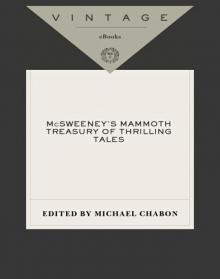 McSweeney's Mammoth Treasury of Thrilling Tales
McSweeney's Mammoth Treasury of Thrilling Tales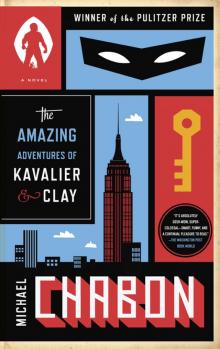 The Amazing Adventures of Kavalier & Clay
The Amazing Adventures of Kavalier & Clay The Yiddish Policemen's Union
The Yiddish Policemen's Union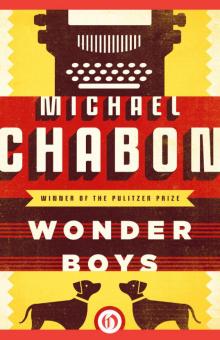 Wonder Boys
Wonder Boys Manhood for Amateurs
Manhood for Amateurs Kingdom of Olives and Ash: Writers Confront the Occupation
Kingdom of Olives and Ash: Writers Confront the Occupation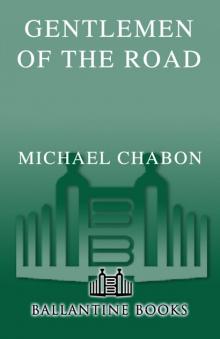 Gentlemen of the Road: A Tale of Adventure
Gentlemen of the Road: A Tale of Adventure A Model World and Other Stories
A Model World and Other Stories Pops: Fatherhood in Pieces
Pops: Fatherhood in Pieces McSweeney's Enchanted Chamber of Astonishing Stories
McSweeney's Enchanted Chamber of Astonishing Stories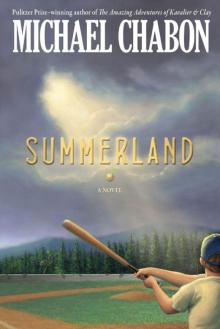 Summerland
Summerland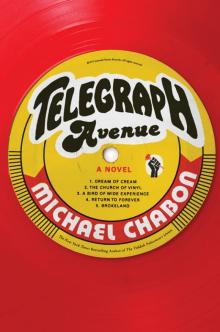 Telegraph Avenue
Telegraph Avenue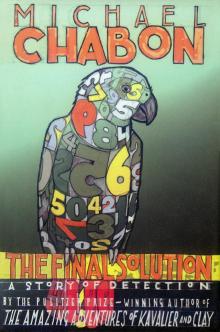 The Final Solution
The Final Solution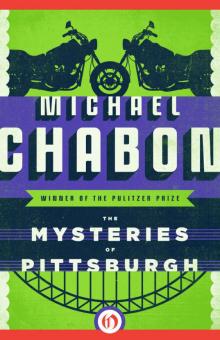 The Mysteries of Pittsburgh
The Mysteries of Pittsburgh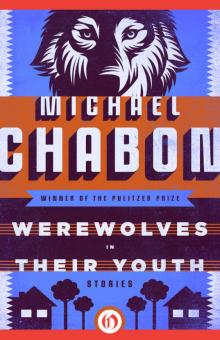 Werewolves in Their Youth
Werewolves in Their Youth Bookends
Bookends Fight of the Century
Fight of the Century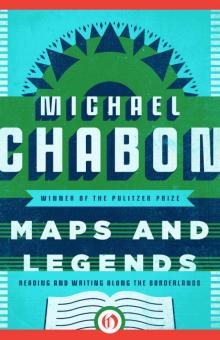 Maps and Legends
Maps and Legends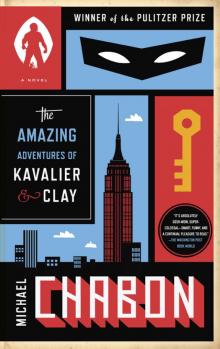 The Amazing Adventures of Kavalier & Clay (with bonus content)
The Amazing Adventures of Kavalier & Clay (with bonus content) Kingdom of Olives and Ash
Kingdom of Olives and Ash Pops
Pops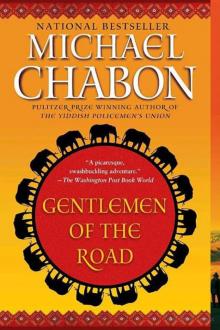 Gentlemen of the Road
Gentlemen of the Road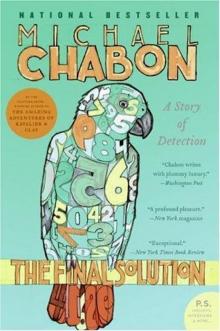 The Final Solution: A Story of Detection
The Final Solution: A Story of Detection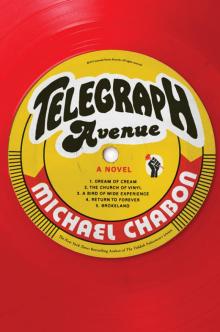 Telegraph Avenue: A Novel
Telegraph Avenue: A Novel